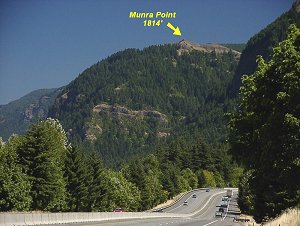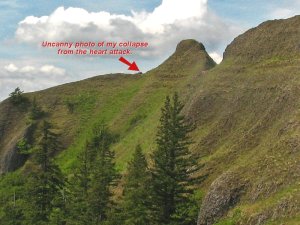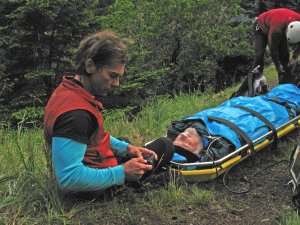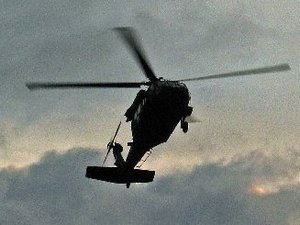by Dennis Stilwell
To watch the video of this rescue, press here.
I never believed it could happen. Not to me. I wasn't the strongest hiker
in the woods, but I was not a candidate for a heart attack. The events of
May 31, 2008 changed my life forever.
I had just climbed Munra Point 10 days earlier, and that was not my first
ascent. I've climbed this ridge on a number of occasions and during a
variety of seasons. This day was perfect. My hiking companion and dear
friend, Terry Hill, accompanied me on this hike.
 A strange thing happened to me about 2/3 of the way up. All of a sudden, I ran
out of strength. I became very exhausted, which would be unusual for me. When
I had climbed the point just 10 days earlier, I did so without stopping or becoming
exhausted. We sat and rested. Soon we were on our way again. But, we didn't
go more than a few hundred feet when I stopped and declared that something was
wrong. I was nauseated and dizzy. I sat down and suggested that my friend, Terry,
go ahead and complete the hike. I would wait there for him.
A strange thing happened to me about 2/3 of the way up. All of a sudden, I ran
out of strength. I became very exhausted, which would be unusual for me. When
I had climbed the point just 10 days earlier, I did so without stopping or becoming
exhausted. We sat and rested. Soon we were on our way again. But, we didn't
go more than a few hundred feet when I stopped and declared that something was
wrong. I was nauseated and dizzy. I sat down and suggested that my friend, Terry,
go ahead and complete the hike. I would wait there for him.
A few minutes went by and I began to experience a really strange phenomena in my
right shoulder and the right side of my neck. The thought did occur to me that
this was a heart attack, but it didn't match anything I thought I knew about
heart attacks. Which turned out to be that I knew nothing about heart attacks.
A lone hiker strolled by me and exchanged greetings. Within a few minutes I began
to feel much better. So, I decided to head to join my friend at the summit.
By the time I reached the ridge line to the top of Munra Point, I was really in trouble.
The fellah that had passed me earlier, was talking with my friend, Terry. This man
came towards me and wanted to know how I was doing. I shared my symptoms.
I couldn't believe my eyes or ears, as this guy reached for his cell phone and called 911.
I knew he was totally over reacting. I was sure I wasn't having a heart attack, and I
was sure I could walk down this mountain. I was wrong.
 The pain of this heart attack was so intense that I do not feel that I can do justice
to trying to describe the event. It hit so hard that I fell over the edge of the ridge line,
and the man sitting in front of me, Dr. Mark Hosko, grabbed me and hung on as I howled,
cried, and dry heaved.
The pain of this heart attack was so intense that I do not feel that I can do justice
to trying to describe the event. It hit so hard that I fell over the edge of the ridge line,
and the man sitting in front of me, Dr. Mark Hosko, grabbed me and hung on as I howled,
cried, and dry heaved.
This angel of God held me and comforted me, and assured me that he had the cavalry on
the way. But, I had to get off this mountain. There was no way anyone was going to
get up there to save me.
Mark helped me to my feet, handed me one of his walking poles, and I began staggering down
this steep and treacherous trail. Gravity pulled me downhill and the angels of God placed
my feet, as I managed to descend 400 feet of elevation before I could no longer stand. I
collapsed in the middle of the trail, writhing in anguish and pain.
 My dear friends could only sit and watch as I clung onto life. It took nearly 3 hrs for the
med-techs to reach me. They were just incredibly professional, courteous, courageous, and
competent. They brought a portable EKG machine, oxygen, and an IV for me, not to mention,
morphine.
My dear friends could only sit and watch as I clung onto life. It took nearly 3 hrs for the
med-techs to reach me. They were just incredibly professional, courteous, courageous, and
competent. They brought a portable EKG machine, oxygen, and an IV for me, not to mention,
morphine.
It took almost three more hours before I was airlifted off that mountain by a military Black hawk
helicopter and flown to Emanuel Hospital in Portland, Oregon. There I was greeted with one of the
northwest's best Cardiologist teams led by Dr. Jhooty and soon a stent was placed in my left descending artery and I am alive.

I share this story not seeking any pity or even empathy. I share this story for two reasons.
I share this story to honor God for placing a doctor on top of Munra Point when I needed him most.
And I want to share with you, my site visitors, some suggestions regarding heart health and how
to recognize a heart attack before to find yourself in this kind of trouble.
Dr. Mark Hosko is an urgent care physician who owns his own clinic here in Portland, Oregon.
(click to view)
As described in this story, here is a list of symptoms that I experienced:
1. A sudden and unexpected fatigue and/or shortness of breath.
2. Nausea
3. Dizziness
4. Strange sensations to the upper chest and neck
Here is a list of symptoms to look for as described on the
American Heart Associations
website:
1. Chest discomfort. Most heart attacks involve discomfort in the center of the chest that lasts more than a few minutes, or that goes away and comes back. It can feel like uncomfortable pressure, squeezing, fullness or pain.
2. Discomfort in other areas of the upper body. Symptoms can include pain or discomfort in one or both arms, the back, neck, jaw or stomach.
3. Shortness of breath with or without chest discomfort.
4. Other signs may include breaking out in a cold sweat, nausea or lightheadedness
|
|
|